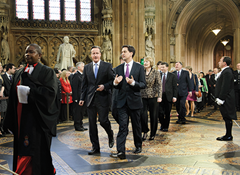UK Government legislative programme 2012
Bills to ring-fence retail banking and create a National Crime Agency, announced in the Queen’s speech, will affect Northern Ireland as a short legislative programme comes before Parliament.
Crime and Courts
Aimed at strengthening border security and combating serious crime, the Bill will establish a National Crime Agency to deal with serious, organised and complex crime, border security, the sexual abuse and exploitation of children, and cyber-crime. It will also remove the full appeal right for family visa visit cases and in-country appeal rights from individuals excluded from the UK by the Home Secretary. The Bill will strengthen immigration officers’ powers to tackle serious and organised immigration-related crime.
Energy
Designed to reform the electricity market to ensure low-carbon generation and security of supply, the Bill will introduce a low-carbon generation revenue support through a feed-in-tariff with contracts for difference, and an emissions performance standard to prevent new coal plants that emit more than 450g/kWh. Energy matters are devolved to the Assembly. However, the Executive has agreed to allow these provisions to apply to Northern Ireland, taking account of devolved competencies and the Single Electricity Market.
Enterprise and Regulatory Reform
To reform competition law and promote enterprise and fair markets, the Bill will create a single Competition and Markets Authority; enshrine the ‘green’ purpose and operational independence of the UK Green Investment Bank; and reform the framework for directors’ pay to link remuneration to the outcome of a shareholder vote.
Groceries Code Adjudicator
To protect suppliers against unfair treatment by large retailers, the Bill will create a groceries code adjudicator to uphold the groceries code. Established in 2009, the code limits large retailers’ powers to change trading arrangements with suppliers and obliges them to treat them fairly.
House of Lords Reform
This Bill is likely to provide for a mainly elected chamber, with one, non-renewable 15 years term (for elected members). The single transferable vote is proposed. Lords elections would be concurrent with those for the House of Commons, but with one-third of seats elected at each poll. The link between peerages and House of Lords membership would be broken, and standing orders could be amended to suspend or expel any member.
Justice and Security
The Bill aims to strengthen oversight of the security and intelligence agencies and allow courts to hear a greater range of evidence in national security cases by allowing courts, through the limited use of closed proceedings, to consider all material relating to a case (even where national security prevents information being made public). Court will also be enabled to access all information relevant to civil cases in a manner that does not risk national security. Parliamentary oversight of the security and intelligence agencies will also be modernised by extending the Intelligence and Security Committee’s remit (currently including MI5 and MI6) to the wider intelligence community and broadening its powers to access information.
Small Donations
Aimed at increasing charities’ incomes and simplifying their administration, the Bill will provide for a top-up payment similar to gift aid for charities that receive small cash donations of £20 or less, enabling them to claim 25p for every £1 collected in the UK on up to £5,000 of small donations. The scheme will be designed to ensure that small local charities performing charitable activities in local communities are entitled to similar top-up payment levels as larger national charities undertaking similar activities.
Reaction
DUP deputy leader Nigel Dodds welcomed the proposed banking and business reforms and the National Crime Agency. “House of Lords reform and tax cuts for the rich,” Dodds stated, “are very much at the bottom of the list of things that the vast majority of people in this country want this Parliament to be dealing with.” He said that Lords reform should be considered only after barring abstentionist MPs from claiming expenses and making vacant the seats of members who do not swear allegiance within a certain time period (e.g. two months in the Scottish Parliament).
SDLP MP Margaret Ritchie said that the Queen’s speech represented “a notably minimalist programme for government from a Tory-led coalition that has delivered little more than a double-dip recession.” She criticised the Government for preparing to increase public sector workers’ pension contributions (also approved by the Executive despite SDLP opposition) and making it easier for firms to fire staff. The latter proposal does not apply in Northern Ireland, due to devolution. Ritchie welcomed the plans to establish the Green Investment Bank and groceries code adjudicator.
Alliance MP Naomi Long saw very little in the speech for Northern Ireland, “with no indication that a Northern Ireland-specific Bill to deal with double-jobbing and financial transparency of political donations is on the cards.” There was no “stand-out measure” to address economic problems but she welcomed the banking reform proposals.
UUP Social Development Spokesman Michael Copeland welcomed the proposed Children and Families Bill. Though the Bill will only affect England and Wales, he said that proposed reforms, such as strengthening the law to ensure children have a relationship with both parents, should give rise to a review of Northern Ireland’s legislation. Lord Maginnis of Drumglass told the House of Lords that everything he read in the programme “confirms my impression of those exceedingly well-educated folk who occupy the front benches in another place but who seldom appear to have rubbed shoulders with reality.”
Sinn Féin declined to comment.






